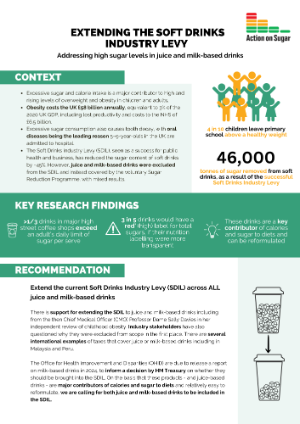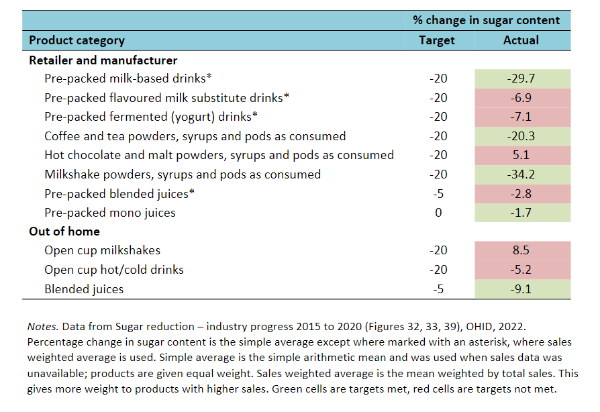Policy
Our new policy briefing released today addresses the high sugar levels in juice and milk based drinks.
Full Policy Brief: Extending the Soft Drinks Industry Levy [PDF 125KB]

- Excessive sugar and calorie intake is a major contributor to high and rising levels of overweight and obesity in children and adults, with 4 in 10 children now leaving primary school above a healthy weight. Obesity costs the UK £58 billion annually, equivalent to 3% of the 2020 UK GDP, including lost productivity and costs to the NHS of £6.5 billion.
- Excessive sugar consumption also causes tooth decay, with oral diseases being the leading reason 5–9-year-olds in the UK are admitted to hospital.
In 2016, the Government published its Childhood Obesity Plan, proposing several measures to reduce childhood obesity, including a 20% reduction in the sugar content of products that contribute most to children’s sugar intake. The SDIL and the Sugar Reduction Programme were two key policies introduced to help achieve this.
Up to 2020, the SDIL Achieved a 46% and 44% reduction in sales weighted average sugar for the in home (retailer and manufacturer) and out of home sector, respectively. In contrast, much smaller reductions in the sugar content of food and drink have been achieved under the voluntary Sugar Reduction Programme. For juice and milk-based drinks specifically, only five out of the eleven product categories have met their target; in some categories sugar content actually increased (Table 1).
Table 1: Target and actual percentage change in total sugar content of juice and milk-based drinks in the voluntary sugar reduction programme (2017 – 2020)
To mark Sugar Awareness Week 2023 we are calling on the government to Extend the current Soft Drinks Industry Levy (SDIL) across ALL juice and milk-based drinks



